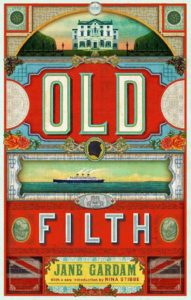As the trees on either winding bank blotted out the landing stage, Edward, who had been struck dumb by the sight of Ada left alone on the tottering platform, began to scream ‘Ada, Ada, Ada!’ and to point back up river. Auntie May held him tight, but he screamed louder and writhed in her arms. She spoke sharply in Malay and he bit her shoulder, wriggled free and seemed about to jump overboard. A sailor caught him by the belt of the shorts that Auntie May had brought and that had astonished him. The sailor lifted him high. Water poured down the sailor’s silky arms. ‘Hai, hai, hai,’ he laughed and Edward lashed out at him, sobbing. He was a tall strong boy of four and a half but the sailor lifted him into the air like a swathe of flowers. Something of the boatman’s smell and his happy eyes reminded the child of Ada, and the sobbing lessened and he went limp.
‘Why does she stay? Why is she not here?’
‘If she came with you, you would never learn English. You and she would talk Malay, as we are doing now.’
‘I will talk Malay with you always.’
‘Not after we get to the Port. You will learn something new. Ada will follow.’
‘Follow?’
“She will follow to the Port when you have to go Home.’
Edward gave a shuddering, hopeless sob. He had just left Home. What would Ada do without him at Home? He was placed in Auntie May’s lap and looked at her with eyes nearly mad. ‘Ada! Ada!’
 This is our first book group title of the year, and isn’t it a terrific one? Who (or what) is Old Filth?
This is our first book group title of the year, and isn’t it a terrific one? Who (or what) is Old Filth?
It turns out Old Filth is the immaculate Sir Edward Feathers, now retired, recently widowed and living alone in Dorset. The name ‘Filth’ is an old joke, ‘Failed in London Try Hong Kong’, but he is anything but a failure. He was a high-flying lawyer, rich and respected, and later a judge. And he is also Eddie, the Raj orphan, sent back to England from Malaya (and his beloved carer Ada) as a small child.
Most of my book group had never heard of Jane Gardam; she’s not exactly a household name, but she is a multi-award winning writer. Old Filth was perhaps her most commercially successful novel. Born in 1928, her first book (for children) was A Long Way to Verona, which came out in 1971. She’s written books both for children and for adults, and it is as a short story writer that I first encountered her. I read and re-read her collections The Sidmouth Letters and Missing the Midnight when I was trying to teach myself how to write. Reading her after many years, I can see her influence, and I could do worse than study her again. Old Filth is a model of economy and style as Gardam swoops boldly back and forward in time to tell the life story of Edward Feathers from birth to death, circling around his early childhood in Malaya, his traumatic time as a foster child in Wales, his oddly happy schooldays, his professional life and relationships. Relationships! Never Old Filth’s strong suit. There’s his wife Betty, his old rival Terry Veneering and his fellow ‘orphans’, Claire and Babs, his schoolfriend Patrick Ingoldby, whose family more or less adopted Old Filth, and his cousin Isobel. Even chance-met acquaintances like Loss, Chinese dwarf wheeler-dealer, or fleetingly seen characters like Alice, the maid of his loathsome aunts, are vivid and real. They build the sense of a fully peopled, whole life. Each scene has beautiful, sharp, convincing detail.
It’s a piece of beautiful writing, short (around 260 pages) book, but economical and brilliant in a way that contemporary writers of brick-like tomes could study. I’ll try to limit the adjectives; it’s a cynical, compassionate, funny and intensely moving portrayal of the way childhood neglect and abuse can percolate through a whole lifetime.
There are two companion books, The Man in the Wooden Hat and Last Friends; I’ve already borrowed them from the Athenaeum.

I LOVE Jane Gardam — I think Bilgewater is my favourite, or maybe A Long Way from Verona — or maybe Crusoe’s Daughter? I was introduced to her by Penni Russon, for which I am forver grateful. I might be about due to reread them, I have collected a shelf -full. The Old Filth trilogy is wonderful, too — oh, and I just remembered have a fat volume of her short stories. Thank goodness she was so prolific.